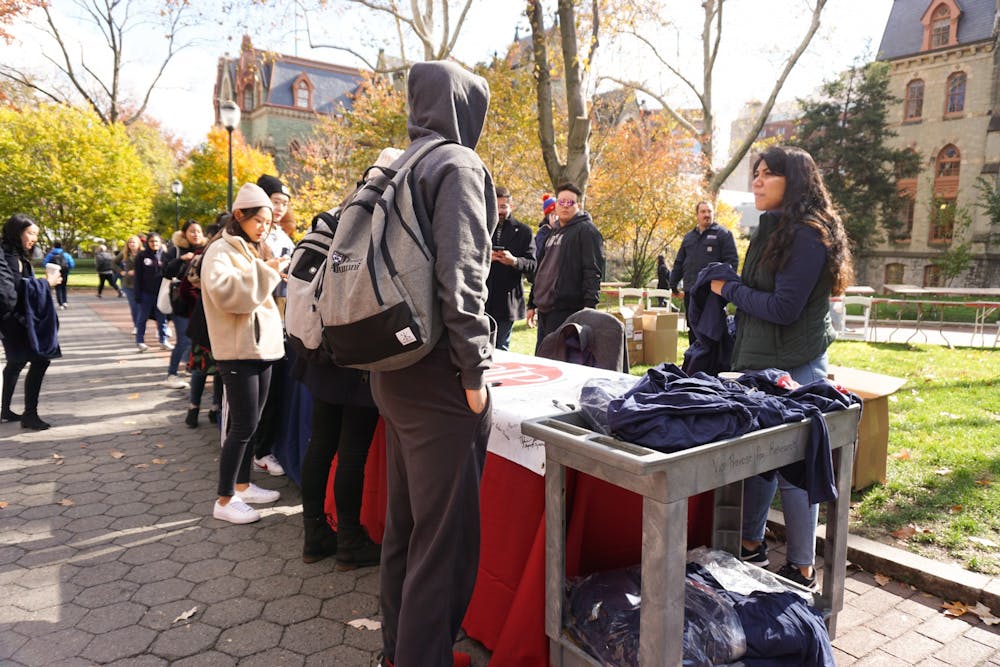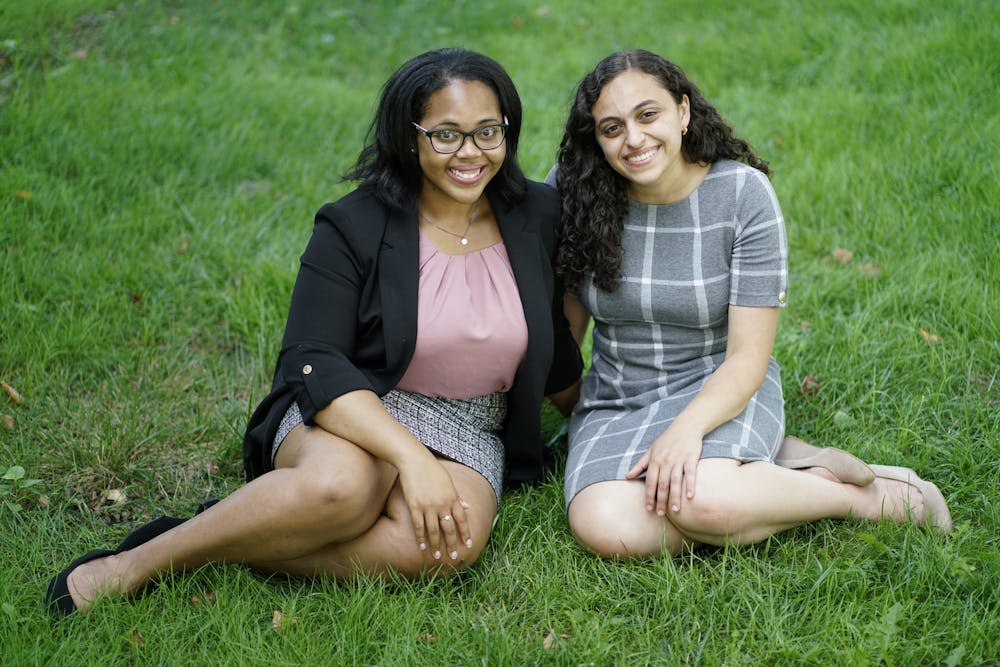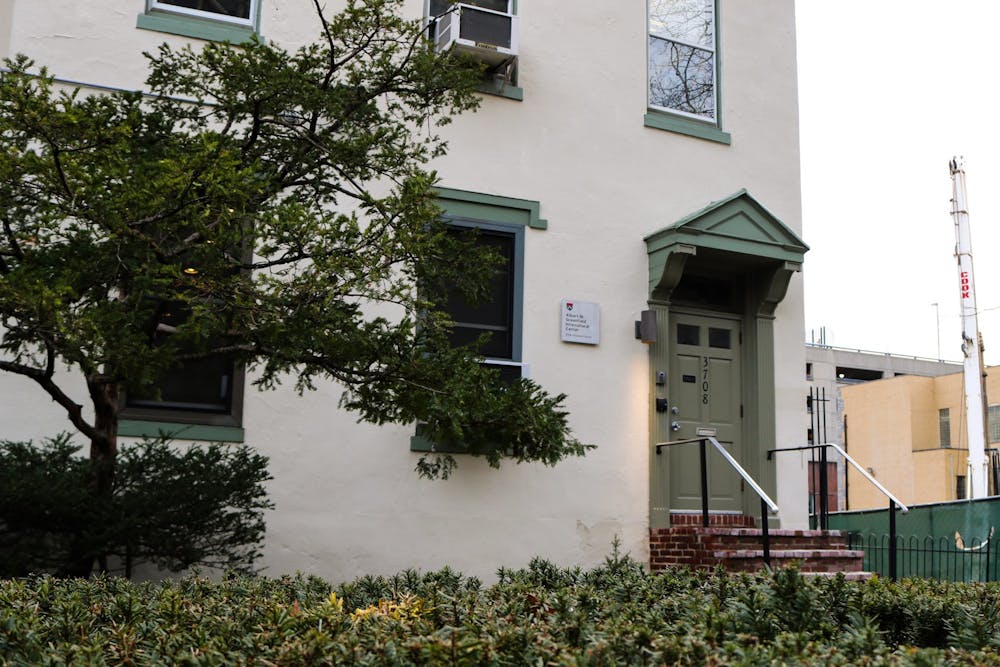
Students signed a banner with words of encouragement for Penn First Plus in celebration of first gen., low income students on Nov. 8, 2019.
Credit: Sukhmani KaurWhile some schools across the country are reckoning with an increased dropout rate among low-income students and students of color due to financial hardships exacerbated by the pandemic as reported by The Washington Post, Penn Admissions reports these findings are not applicable to students at Penn.
Despite the absence of dropout fluctuation, first-generation, low-income students at Penn maintain that the pandemic has certainly hit FGLI students and students of color harder than other students, citing their struggles to secure housing during the pandemic and "disjointed" communication from administration and Student Registration and Financial Services.
“The observations made in the Washington Post article are not representative of the experience at the University of Pennsylvania, at least not as of this early date," Dean of Admissions Eric Furda wrote in an emailed statement to The Daily Pennsylvanian, noting that longer-term impacts of the pandemic on enrollment are not yet ascertainable.
Senior University Director of Financial Aid Elaine Varas echoed Furda, adding that the University's generous financial aid practices and academic support services in Penn First Plus, the University's hub for FGLI students, ensure that FGLI students "are able not just to be admitted to Penn, but to remain enrolled."
While members of the FGLI community are grateful for Penn's financial aid, for which the University's policy is to meet "100% of [a student's] demonstrated need with grant-based aid," many have pointed to other areas of concern, ranging from lack of centralized communication to struggles with finding housing.

Penn First Plus organized the first First Generation College Celebration that ran from Nov. 4 to Nov. 9, 2019 near College Green.
"A lot of FGLI students come from environments that aren't fit for us succeeding at universities such as Penn," College sophomore Nyah Williams said, enumerating obstacles such as faulty internet connection, disruptive phone calls, and familial duties. "There's just extra stress on [us] at home, to the point where it's hard to perform well in school."
Williams was supposed to live in Du Bois College House this fall, but one week before her early move-in date, the University announced it would no longer provide on-campus housing for students. Thinking she would not be able to afford off-campus housing without aid from the University, and hesitant to fill out the on-campus exception form in case her situation was not worthy enough, Williams came to terms that she would need to spend the fall semester at home. Only through a friend did she find out that the University would cover off-campus leases.
"It just seemed like the school just let us find our way, and I feel like for FGLI students they should have a platform or something with all the resources for us, such as housing rates, financial aid questions, and tutoring, so they're all in one place," she said.
Williams was not alone in her struggle to find housing. One FGLI student and Wharton junior, who chose to be anonymous, detailed a flawed mindset of the administration.
"There was this really unfortunate assumption that every student would be able to have the materials necessary or the space necessary to continue working," he said. "Quite frankly, when the pandemic started and I went home, I didn't have a desk at home. I didn't have a room to work [in]. I had to move to my grandparents' house to even start the school year again."
The Wharton junior was originally promised a room in Stouffer College House this fall, and was later reassigned to an off-campus apartment that he was told would be paid for. When Penn moved classes online in August, that option was stripped from him as well. He decided that re-applying to live on campus was not worth the stress after all the back-and-forth, and is living with his grandparents for the fall semester.
College junior and Undergraduate Assembly Vice President Mary Sadallah also found the housing application and reapplication process anxiety producing. Although she was eventually approved to live on campus, she described the whole process as "super, super overwhelming" and a potential reason for why FGLI students may struggle in their classes more than others.
"Most [non-FGLI] students are just figuring out their classes, and are not worried about all this other stuff," she said.
She added that other concerns currently plaguing FGLI students include finding available work-study jobs and managing the increased workload from professors despite the hardships of remote learning.

UA President Mercedes Owens (left) and UA Vice President Mary Sadallah (right) were both recently elected as the first pair identifying as women of color and first-generation, low-income students to lead the student body from 2020-2021. (Photo from Mary Sadallah)
Sadallah did acknowledge that compared to the spring semester, when Penn denied a majority of students' requests to remain on campus, the University has done a better job accommodating students' housing this fall. According to Vice Provost for Education Beth Winkelstein, the "vast majority" of requests to live on campus were granted.
Sadallah, however, agreed with Williams that communication from SRFS and the administration should be proactive, and not reactive.
"When people went home, communication was so disjointed, and it all relied on students figuring out what they needed and what was missing, and then reaching out," she said. "It wasn't as much of admin reaching out to us and saying 'we anticipate these problems and here are solutions.'"
The result of this, Sadallah and College senior and UA President Mercedes Owens explained, is mass confusion and occasional misinformation that arises in the FGLI GroupMe chat.
"The University can produce as many resources as it wants to, but if it doesn't communicate it properly, people won't take advantage of them," Owens said.
College junior Jade Gonzalez, advocacy chair for PennFirst, a student organization for FGLI students, called on the University to implement more student liaisons and forums to combat misinformation of FGLI resources. Both Owens and Sadallah hope to improve student-administration relations during their tenure in office by catering University communications to what works best for the student body.
Penn First Plus Executive Director Marc Lo wrote in an email to the DP that PFP has worked closely with SRFS to ensure that concerns such as internet bandwidth and food support while at home were built into financial aid packages for the fall semester, and other resources such as peer mentors and advising offices were made available. He has so far seen no data consistent with an uptick in low-income student dropouts.
"Penn is collecting data about the student experience during the pandemic, and our colleagues in Institutional Research and Analysis will inform the Provost's office of any disconcerting trends that Penn First Plus might need to address," he wrote.
Gonzalez applied to stay on campus in March due to lack of internet access at her home in a rural town in Nebraska. After seeing Penn reject the applications of many of her peers whom she deemed to be in more dire situations than her own, she made plans to leave. She stored her belongings in the basements of strangers, because she could not afford to pay for third-party storage. By the time Residential Services notified her she was accepted to live on campus around five days later, however, her move-out plans were finalized.
"Marc Lo and the people at the Greenfield Intercultural Center were overwhelmingly responsive and overwhelmingly receptive, to the point where we just started directing all student concerns there, because they were at least kind about not knowing the answer," she said. "I felt the most resistance from non-FGLI administration, which I don't think is that surprising — they just have bigger realms of responsibility."

The Greenfield Intercultural Center has a history of working with FGLI-associated groups.
The Greenfield Intercultural Center's First-Generation, Low-Income Program, created in 2016, works to provide FGLI students with emergency funding opportunities and academic assistance.
Gonzalez, who is now living in an off-campus apartment, offered her insight into why Penn has not seen the same dropout trends as other schools: its financial aid budget.
"Penn has very generous financial aid packages; if I were going to the average state school, I probably would have had to take a gap semester," she said. "A lot of kids that are highly aided and FGLI get more resources being enrolled in school than they would have at home."
Gonzalez added that FGLI students from schools with a smaller financial aid budget are likely dealing with more strenuous financial situations than those at Penn.
"We at least have an administration that is aware of our demographic, and resources to accommodate us as a result, so I am fortunate I am a Penn student right now," she said.
As for the overall trend of increased dropouts from low-income students and students of color, Williams is not surprised. "It's always students of color and Black students who get the short end of the stick in stuff like this because of our history of lack of resources, and people in the administration need to pay more attention to how these populations are being impacted, especially when they claim that they take pride in these populations," she said.
For Lo, the disparity-ridden system of higher education is a microcosm of society as a whole.
"In a society — like the United States — where capitalism and racism preclude Black, Brown, and lower-income people from adequate access to economic, education, and healthcare resources, you are going to witness those inequities reflected among members of our academic community," he wrote.
Wharton and College senior Karen Herrera, who sits on the Penn First Plus Advisory Board and is the internal chair of the Student Committee on Undergraduate Education, agreed, adding that she is dedicated to increasing student awareness of the institutional resources that exist for FGLI students.
"We struggle twice as much as our counterparts, so we need twice as much support to be able to survive the COVID-19 pandemic and to be able to be mentally and physically healthy while we're going through it," she said. "I'm glad [the increase in dropouts] is not affecting Penn as much, but it's something all schools should think about. Why are we seeing these trends? Well these students need more support than what everyone else normally does."
The Daily Pennsylvanian is an independent, student-run newspaper. Please consider making a donation to support the coverage that shapes the University. Your generosity ensures a future of strong journalism at Penn.
Donate







